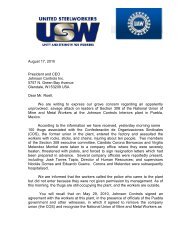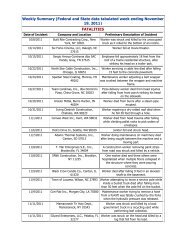National College Players Association - United Steelworkers
National College Players Association - United Steelworkers
National College Players Association - United Steelworkers
You also want an ePaper? Increase the reach of your titles
YUMPU automatically turns print PDFs into web optimized ePapers that Google loves.
Outgoing <strong>National</strong> Labor Relations Board Chairman WilmaB. Liebman poses with former board member Peter CareySchaumber at the NLRB headquarters.AP Photo/ J. Scott ApplewhiteThe USW won two landmarkcases before the <strong>National</strong> LaborRelations Board that ensurethe ability of workers to morefreely exercise their right to organize aunion.“These cases represent monumentalvictories, not just for unions but for allworkers as well when they attempt toorganize in support of better wages andbenefits and safer working conditions,’’International President Leo W. Gerardsaid of the decisions.The two cases were among a flurry ofdecisions released at the end of Augustas the term in office for the board’s chairwoman,Wilma B. Liebman, expired.She asked to not be reappointed.In a case involving Lamons GasketCo., the NLRB overruled a 2007 Busheradecision known as Dana Corp.,which made it more difficult to obtainvoluntary recognition from an employer.Return to original intentThe Dana decision, the USWcontended, violated almost 50 years ofprior NLRB and court law. With LamonsGasket, the board has returned to theoriginal intent of Congress in passing the<strong>National</strong> Labor Relations Act (NLRA) topromote union organizing and collectivebargaining.In a case known as Specialty Healthcare,the USW successfully argued thatthe NLRB should apply its standardcommunity of interest rules to definebargaining units in the nursing homeindustry.24 USW@Work • Fall 2011Both decisions were predictablycriticized by Republicans as activistmeasures that display union favoritism.AFL-CIO General Counsel Lynn Rhinehart,however, applauded the rulingsand called them mainstream decisions,consistent with the original purpose ofthe NLRA.“These are not radical,” Rhineharttold The New York Times. “What wasradical was the Bush board overturningdecades of precedent to invent newrules.”Departing from past practiceIn the overturned Dana case, theNLRB departed from years of precedentby inventing a new procedure thatrequired voluntarily recognized unionsto inform the board and employees ofthe recognition and gave employees a45-day window in which to attempt todecertify the union.In Lamons Gasket, a board majoritysaid Dana imposed an “extraordinarynotice requirement” based on the completelyunfounded suspicion that workersare coerced to sign voluntary recognitioncards. The board returned to the rule thata union, once voluntarily recognized, hasa “reasonable period” of up to a year inwhich to bargain free from the threat of apetition to eliminate representation.According to the NLRB, employeesdecertified a voluntarily-recognizedunion under the Dana procedures in just1.2 percent of the 1,133 cases in whichDana notices were filed.In Specialty Healthcare, the NLRBruled that the USW could organize 53certified nursing assistances at a nonacutecare nursing home in Mobile, Ala.,as one bargaining unit without includingthe facility’s other nonprofessionals suchas janitors, cooks and clerical workers.The board, again returning to theoriginal intent of the NLRA, said the potentialbargaining unit for employees atnon-acute health care facilities would bebased on the same “community of interest”standard used at other workplaces.Under that standard, bargaining units aregenerally based on whether employeeshave similar responsibilities, supervisors,skills, working conditions and payscales.The USW ultimately won the electionat the Specialty Healthcare nursing homein Alabama. Ballots that had been setaside from a 2009 election were countedafter the ruling was issued. The USWwas notified of the victory on Sept. 16.The USW’s Organizing and Legaldepartments worked together in the casesto secure positive changes for unionsand working people. Organizing counselBrad Manzolillo handled the petition forreview that got the Lamons case started.Associate General Counsel Dan Kovalikbriefed the board in both cases.“These cases will now permit workersto more freely exercise their rights toorganize and collectively bargain – rightsenshrined not only under the <strong>National</strong>Labor Relations Act, but also under theInternational Labor Organization’s (ILO)core conventions,” Gerard said.






